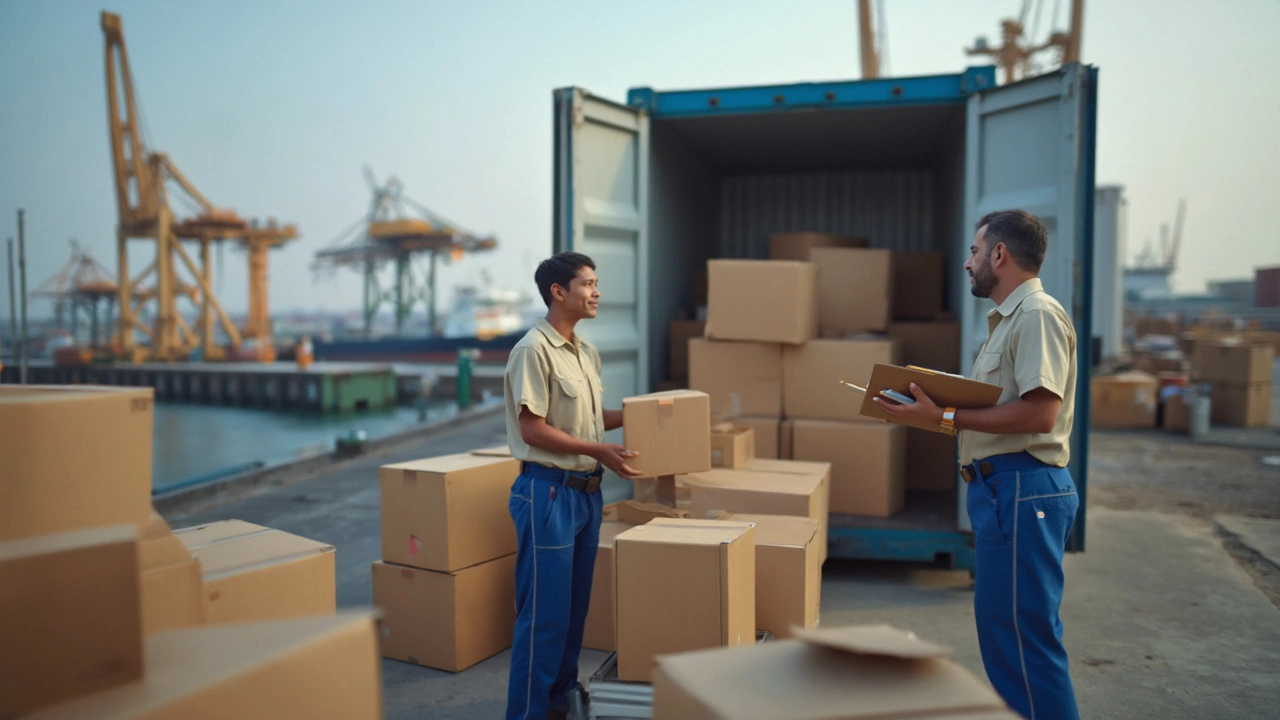Staring down a mountain of boxes in your living room makes you question every purchase, right? Then comes the wild reality of shipping your stuff overseas. That’s when sticker shock hits for real. Most people don’t realize just how fast shipping quotes can balloon—especially if you haven’t done this before. But cutting costs on international relocation isn’t some secret art. It’s more about strategy, common sense, and learning from people who’ve already sent their lives across seas, one box at a time. Ever noticed you only hear the horror stories? Today, I’ll show you that moving your household goods overseas doesn’t have to drain your bank account (even if your couch did). Whether you’re chasing a job, heading for adventure, or moving closer to family, a smarter move means more cash left for the fun stuff, not just the freight costs.
Understanding International Shipping Options
Let’s get the nuts and bolts sorted out. When you’re shipping overseas, you basically have two choices: air freight or sea freight. Most people automatically assume air is quicker—and it is! But it comes with a sky-high price tag. Sending a single box to Tokyo by air will cost you more than your favorite piece of furniture is worth. I’m not exaggerating—quotes for air shipments are often triple or quadruple the cost of sending the same thing by sea.
The real budget option is sea freight, specifically something called groupage or shared container service. Imagine your stuff sharing a massive steel container with other families’ belongings, like some communal voyage across the waves. You’re not paying for an entire 20- or 40-foot container—just the space your goods occupy. If you’ve ever stuffed your hatchback for a road trip with your kids (shout out to Emery’s endless toy collection), then you already get the idea: maximize your packing skills and pay for what you use, not empty air.
Full container load (FCL) is possible if your house is truly bursting at the seams. But for most, less than container load (LCL) is the smart move. Courier services like FedEx, UPS, and DHL do international moves too, but for large shipments, they’re terrain for the rich or those in a panicked rush only. Stick with traditional freight forwarders and reputable shipping agents—they handle personal moves every day and can guide you through the maze of paperwork, pickup, and delivery options.
Something most people miss: insurance. You’d think this is a spot to cut corners, but it only takes one lost box of grandma’s teacups to realize this is where a few extra bucks pay off big. Also, each country has its own rules about what you can and can’t ship. For example, Australia is strict on anything that’s touched dirt (even Max’s toy ball would face scrutiny). Double-check customs requirements—sometimes a small cleaning fee is nothing compared to the hassle of confiscation or fines.
How to Save Money: Packing, Decluttering, and Planning Ahead
This part is where the real cost savings come in. Start with an honest look at what’s worth hauling halfway around the planet. Trust me, hauling every book you ever owned (or Emery’s outgrown toddler bed) will cost more than buying it again in your new country. The golden rule: if you haven’t used it in a year, don’t pay to ship it. Most moving experts—and folks on online expat forums—swear by ruthless decluttering. Donate, sell, or gift what won’t make the trip. I’ve used local Facebook Marketplace groups to offload stuff in days. It saves money on volume and weight, and you’ll thank yourself when you’re unpacking on the other side.
When it comes to packing, there’s a reason professional movers wrap everything like it’s headed for a NASA launch. Sea journeys are long and bumpy. Boxes can get stacked and restacked a dozen times. That means sturdy double-walled boxes, generous padding, and clear labeling. Pro tip: buy your packing supplies in bulk. Big-box hardware stores or online suppliers almost always beat the prices you’ll get from moving companies. And pack everything as tight as a game of Tetris, leaving zero dead space (because empty space costs the same as filled space in volume-based shipping).
Timing matters, too. If you plan ahead, you can book flexible shipping slots, avoiding high-season surcharges just like with airline tickets. Families moving in summer, right around school breaks, always face higher rates. If you can shift your move a few months, prices can drop as much as 20%. Some shippers offer discounts for midweek collections, or for being flexible with pickup and delivery dates.
Last, join local or international expat groups where moving tales get swapped like campfire stories. People spill the beans on which companies delivered on promises, what paperwork caught them off guard, and how they dodged sneaky fees. You’d be surprised how much you can save with just a bit of advice from someone who’s one step ahead.

Shipping Companies and Comparing Quotes
Here’s the part that can feel overwhelming: deciding which company to trust with, well, your life in boxes. There’s a wild difference between a reputable international mover and the kind that ghost you after pickup. So, start by looking for companies that specialize in international household moves—think big names like Allied, Mayflower, or Crown Relocations, but don’t ignore local freight forwarders with good reviews. Companies that are FIDI or IAM certified have to meet strict international standards, so double-check those memberships.
Don’t just grab the first quote you get. Cast a wide net—at least five detailed quotes, all based on the same inventory of goods. Get the company to do a virtual survey, where you show off your space and items so they give an accurate estimate. Beware of rock-bottom offers that sound too good to be true. Some shippers quote low and then hit you with sneaky port fees, delivery surcharges, or storage charges at your destination. Always ask for what’s included in the door-to-door price and what’s excluded. If the quote doesn’t mention customs clearance, insurance, or delivery to your new address, you can bet those costs will pop up later.
Ask for written quotes specifying volume (in cubic meters or feet), transit time, insurance costs, and payment schedules. The magic word is "transparent." Read online reviews—but prioritize recent ones, since companies change ownership and standards slip fast. A good moving company will walk you through customs paperwork, explain how tracking works, and provide a clear timeline (even if there are delays at sea, they’ll communicate).
Watch out for rogue brokers who don’t have their own trucks or warehouses but just farm your business to whoever will take it cheapest. It can lead to lost boxes, delayed shipments, or worse. And if you get cold-called after entering your details into one website, that’s a red flag—quality movers don’t chase you, you chase them. If in doubt, trust your gut and ask probing questions about logistics, liability, and support at your destination.
Paperwork, Customs, and Things That Trip People Up
No two countries treat imported household goods the same. Customs rules can be a web of paperwork, limits, and what feels like arbitrary rules. For most moves, you’ll need an itemized inventory—think every chair, plate, and phone charger—plus proof of your overseas residency or visa status. Some countries demand receipts or proof of ownership for high-value items, so corral your paperwork early.
Every country has a peculiar list of prohibited or restricted goods. For example, shipping electronics into India often means extra scrutiny and taxes. Moving to the UK? That antique rocking horse could require special permits thanks to strict timber import rules. And don’t even think about packing food, plants, or animal products unless you want to make customs agents grumpy. Remember, customs clearance fees are real—and sometimes not included in your mover’s bid. Ask up front, and set aside a buffer fund for the unexpected.
Don’t ignore import duties and taxes. In some cases, like moving to Australia or New Zealand, you’ll get exemptions for household goods if you’re moving for work and have proof. But bring in new-in-box gear, and it’ll get flagged for duty. Some movers include customs brokerage in their quote; others leave you to fend for yourself at the port. If you need storage on arrival (“port congestion” isn’t just a news headline—some ports are so jammed, containers sit for weeks), you might face daily charges, so knowing your mover’s end-to-end plan matters.
Avoid last-minute stress by scanning all key documents—passports, visas, detailed inventory, receipts—into an app or cloud folder. Paperwork is usually the main thing that can stall or derail your shipment. Quick access can mean the difference between a smooth transition and weeks of hair-pulling. Oh, and get written confirmation of arrival dates, so you aren’t stranded without furniture if your things run late.

Smart Tips for a Stress-Free, Budget-Friendly Move
Ready for the secret sauce? Combine the best of every tip above. Start months ahead and build a timeline. List what you truly need to take, then pare it down even more—your back (and wallet) will thank you. Go for groupage shipping by sea. It’s slower, but the price cut is hard to beat. Use trusted international movers with verifiable experience, and request detailed, written quotes. Factor in insurance—not just on price, but on peace of mind.
Be kind to yourself—moves are intense, especially with kids and pets. On our last move, Max the dog got his own labeled box for toys. That way when the jet lag hit and all Emery wanted was her old bedtime book, we knew exactly which box to open. A bit of planning pays off on chaotic unpacking days. Label every box by room and key contents—using different colored tape or big markers saves so much time later. And don’t forget essential boxes: that one with your coffee, bedding, chargers, or Max’s treats. Keep those with you as much as possible for the trip itself.
If your move involves more than one country—say, a layover in Amsterdam before heading to your new home in Cape Town—ask your shipper about transshipment rules and timelines. Any extra handling can mean opportunities for delays (or worse, missing goods). Build in time for surprises: international moves rarely go fully according to script.
Once landed, connect with other expats for shared tips on navigating the local scene. You’ll find out where to buy cheap furniture basics, which supermarkets cater to homesick newcomers, and where the dog parks are for Max to burn off energy while you catch your breath. Settling in always takes longer than you expect, but knowing you saved hundreds or thousands on shipping makes every box a little lighter.
No matter where you’re headed, remember it’s only stuff. The real value in any international move isn’t just what’s packed, but in knowing you outsmarted the system, got your goods there safely, and still have enough cash left over for ice cream on arrival. That’s how you make global moves work for you, your family, and even your dog.





